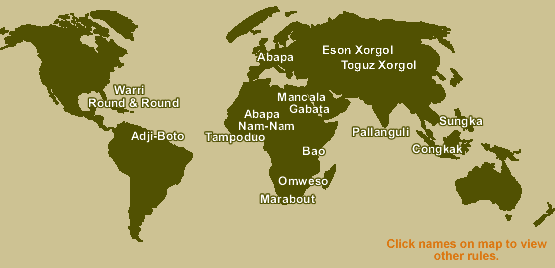

|
|


Over the years a lot of confusion has developed over the many differing names Oware is known by. The problem has been that as many languages that there are in one particular country there will be about the same number of names for Oware, plus the names that would come under these generic names. So for example in Ghana there are over 49 different languages and some of the generic names are Oware (Akan), Awele (Ga), Adji-Boto (Ewes) and many more. This scenario is repeated in almost all African countries. This has lead to some people identifying the wrong names with differing rules. We have decided in order to try and solve this problem, to promote Oware (Abapa) as the foremost version to be played whilst still highlighting accurately the differing versions that exist.
Oware or variations of this name is the most popular name the game is known by, along the West African coast and the Caribbean i.e. the 2x6 type. E.g. of these are Warri, Awale, Awele, etc. Oware is the name given to the game by the Akan speaking people of Ghana. Even this name is a generic name, with at least three versions being covered by this umbrella name. Traditionally and today the version that has been used in competitions is known as Abapa (literally translated as the proper version). Abapa has always been known as the adult's version, played by those who have graduated from playing Nam-nam the children's version. Oware belongs to the pit and pebbles or count and capture classification of games.
There are many versions of pit and pebble games, over 300 in all, having differing rules. Three major types exist, distinguished by the number of rows the board has. Two row boards are the most popular of which Oware is an example. These games can have a varying number pits along the board from 5 to 14, but the 6 pits long board is the most popular. Being played predominantly in West Africa and the Caribbean. Although Bao is the most popular name for the Four-row type, it has other names depending on the version. You will find these played mainly in East Africa. Three-row type e.g. Gebeta is the least popular and is confined to Ethiopia and Eritrea to our knowledge.
A major obstacles to understanding the many differing versions that exist has been the use of Mancala as a generic name for all versions of count and capture games by academics. Mancala (Mankaleh meaning the game of intelligence) to our knowledge is only one version of Oware played in predominantly the Arabic speaking part of the world. Although it uses the same board the rules are different to Oware. Whereas with Oware captured seeds are taken of the board or stored in houses at either side of the board, thus making these store houses, unnecessary as the captured seeds can be placed in front of you behind the board. Mancala is different in that these end storehouses are necessary to play the game, as when sowing the seeds one has to sow in these end houses to capture seeds. Mancala is the same as Bantumi, which is featured on Nokia phones. It is also similar to Sungka and Chongkak played in the Philippines, Indonesia and Malaysia in how seeds are captured. These have varying number of seeds to begin the game, from 3 to 7.
Another problem has been that the same sets of rules have been called different names because of language differences. This is especially true for the West Coast of Africa where in Ghana Oware (Abapa, Nam-nam, Tampoudo e.t.c.) is known as Ayo (Ayoayo, Jerin-jerin, Ayo J'duo e.t.c.) by the Yoruba speaking people of Nigeria. In Cape Verde the Abapa or Ayoayo version is also known as Ouri. Another level of complication is that for Ouri there is a variation of this same set of rules where capture is compulsory, this is called the Ourin mode by Olivier and Didier Gullion programmers of Awale the computer program that plays several versions of Oware.
We hope what is detailed above will go some way to clearing up some of the confusion that surrounds Oware and the many versions that exist. This not by any means the end of the story or the final word on the matter. So if you have anything to add make, please feel free to e-mail us at admin@oware.org with your comments